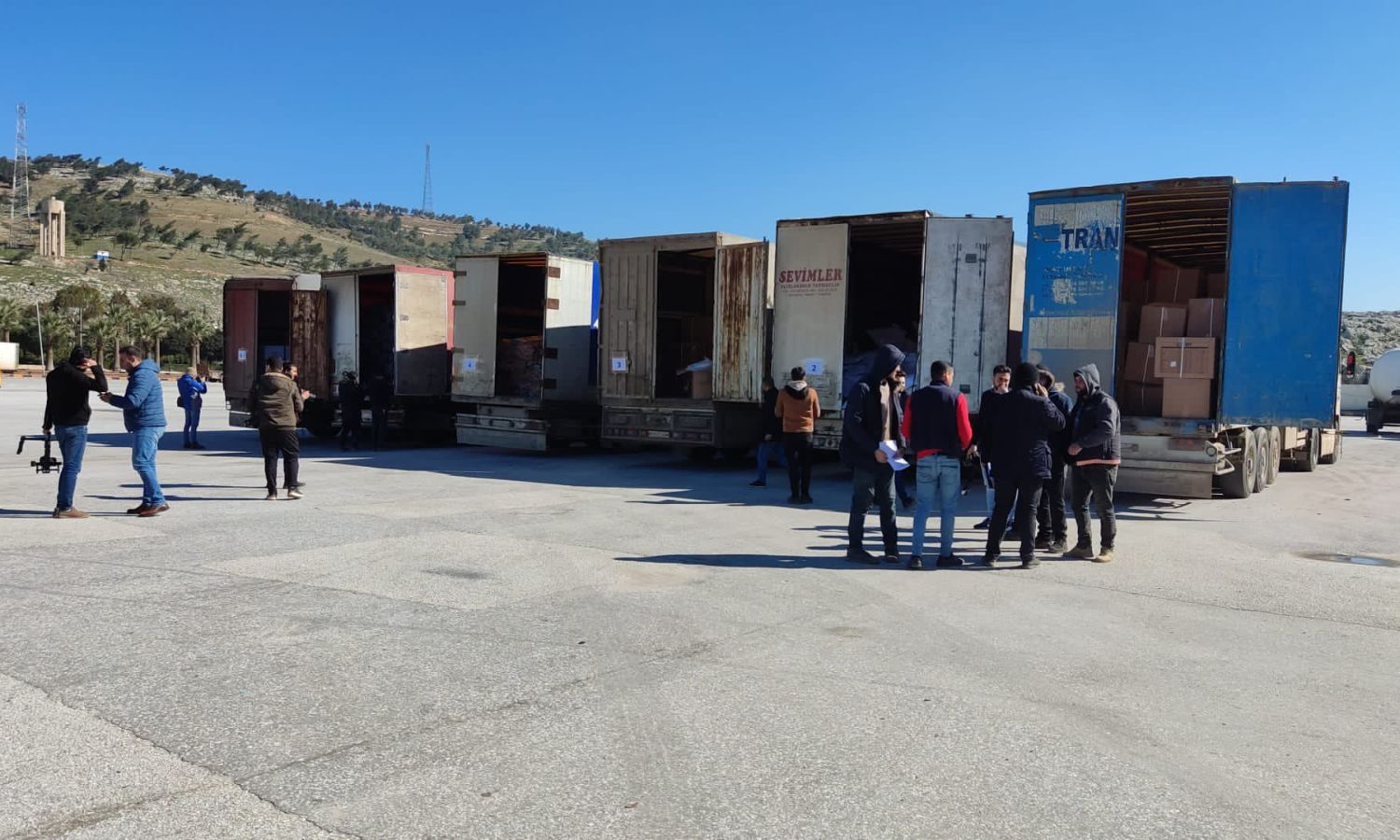



The first UN quake aid convoy to northwestern Syria arrived at the Bab al-Hawa border crossing between Syria and Turkey after the earthquake that struck southern Turkey and northern Syria four days ago, killing more than 16,000 people and leaving tens of thousands injured.
Mazen Alloush, director of the media office at the Bab al-Hawa crossing, told Enab Baladi that the UN convoy arrived today, Thursday, at the crossing, carrying medical aid.
The United Nations said that it had received assurances that the aid would reach the earthquake-ravaged areas in northwestern Syria through the only crossing authorized by Turkey for UN aid (Bab al-Hawa) and demanded that the aid not be “politicized,” according to the AFP.
Sources from Bab al-Hawa crossing told Reuters that the convoy includes six trucks, that the border crossing is open to humanitarian aid, and that the authorities will open several other crossings after two days if things go well.
The first United Nations convoy carrying aid to Syrians stricken three days ago by a deadly earthquake crossed from Turkey on Thursday, witnesses and a border crossing official told Reuters.
The convoy entered Syria at the Bab al-Hawa crossing, the sources said. Turkish authorities said they would open other crossing points in two days if security was sound.
The United Nations did not clarify whether this aid was directed to Syria due to the earthquake or whether it was scheduled in advance.
The needs are increasing in the aftermath of the earthquake, which claimed the lives of at least 1,900 people and destroyed 418 buildings completely, and more than 1,300 buildings partially, in northwestern Syria, according to the Syria Civil Defense statistics.
It stuck at night and was followed by powerful aftershocks. The death toll from it succeeded 16,000 on Thursday as frustration simmered over the slow delivery of aid.
The UN Envoy to Syria, Geir Pedersen, earlier said “absolutely everything” was needed in terms of aid following Monday’s huge earthquake, which devastated swathes of southern Turkey and northern Syria.
“We need lifesaving aid,” Pedersen told reporters in Geneva.
The UN has described Bab al-Hawa as a “lifeline” for accessing the opposition-controlled area of Syria, where it says some 4 million people – many displaced by the country’s 12-year conflict there – were already relying on humanitarian assistance before the quake struck, Reuters reported.
The Bab al-Hawa crossing was closed to the wounded, travelers, and commercial trucks, while the bodies of the earthquake victims’ relatives in the region entered from the Turkish side for burial in their cities and towns. More than 350 bodies were received.
Stéphane Dujarric, Spokesman for the Secretary-General of the United Nations, said on Tuesday briefing that the road leading to the Bab al-Hawa border crossing from Turkey to northern Syria was damaged, which temporarily disrupted the delivery of aid to the northwest, explaining that the crossing itself was not damaged.
The United Nations announced a $25 million grant to help kick-start the humanitarian response in Turkey and Syria.
Medical cadres and rescue teams from the Civil Defense (The White Helmets) in northwestern Syria continue to provide various medical services and rescue those stuck under the rubble amid the small numbers of staff and the weak logistical capabilities of equipment, devices, machinery, and others. This made rescuers work continuously and uninterruptedly from the earliest hours after the devastating earthquake.
Abdul Hamid Qatini, a media figure in the Syria Civil Defense (SCD) team, told Enab Baladi on Wednesday that the rescue team needs heavy drilling mechanisms, rescue assistance equipment, fuel, and power generators, and the need is concentrated on search and rescue works because hundreds of families are still under the rubble.
After a catastrophic earthquake and series of aftershocks hit Turkey and Syria three days ago, killing 16,000 people, the rescuers pulled more survivors from beneath the rubble of collapsed buildings Thursday, but hopes were starting to fade of finding many more people alive more than three days, The AP reported.
In the latest statistics issued by the Syria Civil Defense, the death toll from the earthquake in northwestern Syria has risen to more than 1900 deaths and more than 2,950 injured, with the number expected to increase “significantly” due to the presence of hundreds of families under the rubble and the occurrence of aftershocks.
In regime-held areas, the latest statistics of the regime’s health ministry showed that the death toll reached a total of 1,262 while 2,285 people have been injured.
if you think the article contain wrong information or you have additional details Send Correction